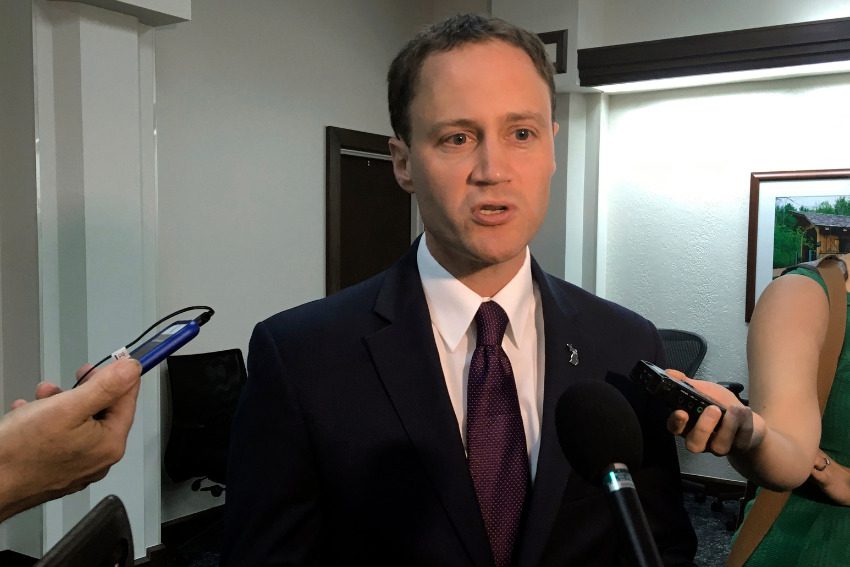
Signatures are being collected by groups that want to change state laws or amend the state Constitution. This is your guide to understanding what they want to accomplish.
MICHIGAN—Thousands of Michiganders will be asked this summer to sign petition drives that seek to change state laws or amend the state Constitution in time for the 2026 general election.
You’ll likely see signature gatherers on public sidewalks, in parks, at farmers markets, college campuses, and community events. And if these groups collect enough signatures, their proposals will go to voters to decide during the statewide general election on Nov. 3, 2026.
But here’s the catch: Petition circulators in Michigan are legally allowed to lie. That’s why it’s important to take your time and do your own research before signing anything.
At least three groups are actively collecting signatures, with several others still pending.
Here’s your guide to the biggest proposals making rounds this summer:
Rank MI Vote
Petition sheets are now circulating for a campaign to shift Michigan elections to ranked choice voting. If successful, it could fundamentally change the way Michiganders elect officials to federal and statewide offices—possibly in time for the next presidential election in 2028.
Rank MI Vote wants to implement ranked choice voting for major party primaries—including for president, governor, and both the US House and Senate—and for general elections for those offices, as well as for attorney general and secretary of state. The plan would also enable ranked choice voting in state legislative and local races if communities choose to adopt it.
Here’s how it works: Instead of picking just one candidate, Michigan voters would rank them in order of their personal preference. If no one wins a majority of first-choice votes, the candidate with the fewest is eliminated and their votes are redistributed to second-place choices. That process would repeat until someone secures a majority.
The petition language was approved in June. Organizers began collecting signatures this month and must gather at least 446,198 valid signatures within 180 days to qualify for the 2026 ballot.
AxMITax
This constitutional amendment seeks to eliminate property taxes in Michigan. And in exchange, it would dedicate a larger share of state sales tax revenue to local governments.
The proposal would also shift 10% of state income, marijuana, alcohol, and tobacco taxes to local communities and require a two-thirds vote in the Legislature to raise taxes by more than 0.1% over five years. It also calls for 60% voter approval on all local tax hikes.
Supporters say the proposal is all about reclaiming “true property ownership” in Michigan. But critics say the plan lacks a workable replacement for the $20 billion in annual property tax revenue that’s actively funding things like schools, roads, libraries, and emergency services.
Invest in MI Kids
This petition would raise taxes on Michigan’s ultra-wealthy to fund public education.
Specifically, the proposal would add a 5% income tax surcharge on individuals earning over $500,000 and joint filers earning over $1 million. It wouldn’t affect anyone earning less. And the change would generate an estimated $1.7 billion annually for public schools beginning in 2027.
Under the plan, the funding would be restricted to classroom-related expenses, like hiring and retaining teachers, career and technical education, and reducing class sizes. Annual audits would also help ensure transparency and accountability over how the tax revenue is spent.
Like the other statewide initiatives, this petition will also need to collect more than 446,000 signatures in 180 days before it can be decided on the ballot in the 2026 general election. The Board of State Canvassers approved (but rescinded) petition language for this effort. Campaign organizers are still actively collecting signatures.
Mop Up Michigan
Michiganders for Money Out of Politics (AKA Mop Up Michigan) wants to ban all political donations from the state’s biggest utility companies—like DTE and Consumers Energy—as well as other corporations with large state or local contracts that total over $250,000 a year.
Petition language was submitted and is awaiting approval from the Board of State Canvassers. If approved, the group will need to gather 356,958 signatures in 180 days to make the ballot.
Supporters—like Clean Water Action Director Sean McBrearty—say the measure will help Michiganders “take back their power” from utilities and government contractors who have “used their incredible wealth to purchase power in Lansing that rightly belongs to the people.”
Voters to Stop Pay Cuts
Led by One Fair Wage, this referendum campaign aims to repeal Michigan’s new minimum wage law and reinstate a 2022 court order that would phase out the lower tipped wage by 2030.
Under the current state law, the minimum wage climbed to $12.48 in February and is set to hit $15 by 2027. The existing state law also preserves a separate, lower wage for tipped workers—something that labor advocates have long argued is unfair and outdated.
Petition language was approved in June. Signature gathering is expected to begin this summer.
If the referendum qualifies and voters approve it, the current law would be tossed—giving tipped workers a temporary wage bump while reducing wages for non-tipped workers until the original court order takes over. Supporters of the plan say the effort will restore fairness for low-wage workers. Opponents have warned the campaign could backfire and reduce wages overall.
Committee to Protect Voters Rights & Americans for Citizen Voting
Two conservative-aligned groups—Americans for Citizen Voting and the Committee to Protect Voter Rights—have also submitted three separate petition initiatives that would change Michigan’s voting laws by requiring documentary proof of citizenship and photo ID to vote.
The proposals were approved for circulation but do not yet appear to be collecting signatures. Once they start, they’ll have 180 days to gather 446,198 signatures to make the 2026 ballot.
Each of the proposed amendments would eliminate the affidavit option for voters without ID on Election Day, as well as require election officials to verify citizenship during registration.
Supporters argue the proposals will prevent fraud, despite no evidence of widespread issues in Michigan. Opponents warn they would disenfranchise voters—especially women who’ve changed their names after marriage and people without easy access to government documents.
READ MORE: Ballot initiative seeks to ban political contributions from utility companies
Don’t miss Michigan’s biggest stories—follow The ‘Gander on X.
Editor’s Note: This story was updated on Aug. 19 to include new details about ongoing petition drives.
Support Our Cause
Thank you for taking the time to read our work. Before you go, we hope you'll consider supporting our values-driven journalism, which has always strived to make clear what's really at stake for Michiganders and our future.
Since day one, our goal here at The 'Gander has always been to empower people across the state with fact-based news and information. We believe that when people are armed with knowledge about what's happening in their local, state, and federal governments—including who is working on their behalf and who is actively trying to block efforts aimed at improving the daily lives of Michigan families—they will be inspired to become civically engaged.


Opinion: Michigan youth wants more choices, and ranked choice voting delivers
Michigan College Democrat makes the case for ranked choice voting statewide. Michigan is home to a diverse, hardworking electorate, but our...

Ballot initiative seeks to ban political contributions from monopoly corporations, like utilities
BY BEN SOLIS, MICHIGAN ADVANCE MICHIGAN—A ballot initiative is in the works to ban corporations with large existing or pending government contracts...

Former Michigan House speaker joins increasingly crowded GOP primary for Michigan governor
LANSING—A former GOP state lawmaker who served as speaker of the Michigan House of Representatives is joining a crowded bench seeking the Republican...

Mallory McMorrow runs for US Senate to ‘cut through the BS’ and deliver for Michigan
Exclusive: State Sen. Mallory McMorrow opens up about her rural roots, viral rise, and why she believes Michigan needs bolder leadership to take on...

Ingham County clerk joins secretary of state race
BY BEN SOLIS, MICHIGAN ADVANCE MICHIGAN—Barb Byrum will seek the Michigan Democratic Party nomination for secretary of state in 2026, she announced...





